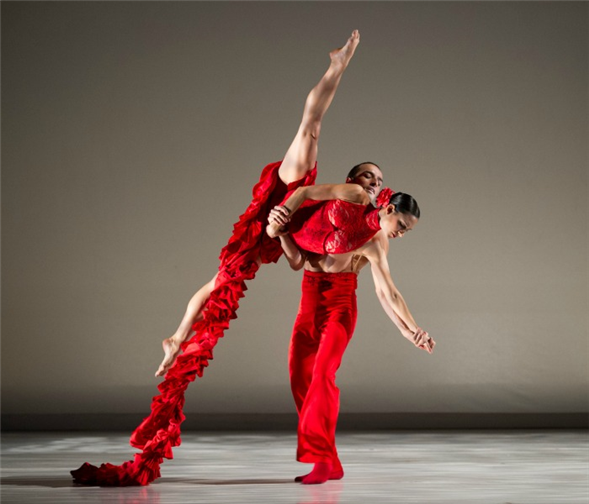Translate Page

Ballet Hispánico presents two world premieres inspired by the Spanish writer
---
"I'm trying to branch out the awareness of what it is to be Latino in all its fabulousness -- not just from iconic representations or stereotypes from the past," says Eduardo Vilaro, the artistic director and CEO of Ballet Hispánico. Founded in 1970, the New York-based dance school and performance troupe has always worn its culture proudly on its stylish sleeve. That identity has, of course, evolved over the decades, especially since Vilaro came on in 2009. The company's upcoming six-day spring run at the Joyce, which kicks off April 10, reflects the rich history of Latino fabulosity with a lineup that includes a pair of world premieres inspired by Spanish literary icon Federico García Lorca.
Carlos Pons Guerra's Waiting for Pepe, based on Lorca's The House of Bernarda Alba, and Gustavo Ramírez Sansano's Espíritus Gemelos, about the writer's relationship with artist Salvador Dalí, were both developed at Ballet Hispánico's Instituto Coreográfico, which was launched by Vilaro in 2010. This innovative learning laboratory provides a safe place for Latino choreographers to explore their craft and heritage while providing Ballet Hispánico with new material.
According to Vilaro, Guerra's piece reimagines Lorca's 1936 play about a matriarch who forbids her daughters to date through a "gender-bending" lens. "There's marches, there's a militaristic feel, there's desire and repression," he says. The result feels like a Pedro Almodóvar film transformed into modern dance.
Meanwhile, Sansano's Espíritus Gemelos, which translates as "twin spirits," explores the passion Lorca and Dalí shared for their respective crafts -- and each other. "The romance never came out, but it's known," says Vilaro. "The letters were put out. This is another side of who we are, LGBTQ Latinos. It opens up a new way of looking at Lorca and his work."
In Espíritus Gemelos, dancers representing Lorca and Dalí work at a far remove from one another, but are aware of what the other person is doing. It's less of a flirtation than it is a slow burn that explodes into daredevil catches and grappling that would not look out of place in a wrestling match were it less gentle. "I felt that Gustavo was the right choreographer for this idea because a few years ago he made one of the most beautiful male duets I've ever seen," says Vilaro. "It was tender yet not stereotypical. Maleness with the subtlety of intimacy as well."
Also on Ballet Hispánico's Joyce lineup are Annabelle Lopez Ochoa's Línea Recta from 2016 and Michelle Manzanales' Con Brazos Abiertos from last year. The latter is an identity mambo featuring an American woman at odds with her Mexican heritage. It juxtaposes traditional mariachi marches with high-flying contemporary dance to illustrate the friction between first-generation immigrants and their assimilated relatives.
Línea Recta features a coterie of scorpion-like women ruling over a pack of men with flamenco steps and long dresses that they whip around the stage. "Annabelle shows that flamenco can be contemporary and the women can be strong," says Vilaro. "She has the men come and do this very cute partnering together and they fall apart. Then the women come back in and bring the strength. I love that and people get it." (Indeed, when I saw the piece last year, a woman sitting next to me whispered to her mother, "That's grandma all the way.")
"Annabelle saw it recently and she was crying and I was like, 'Oh my god, what did we do wrong?!'" recalls Vilaro. "And she said, 'It's perfect. It's theirs now. It's not mine anymore.' When a choreographer says that, I mean, this is the first time it's ever happened in my life! And I was like, wow. It's because we've been taking care."
It's that level of commitment and meticulousness that allows Ballet Hispánico to celebrate the diverse Latino community in all of its nuances.
---
A dancer and playwright, Juan Michael Porter II has contributed articles to Ballet Review, The Dance Enthusiast, Broadway World, and HuffPost. Follow him at @juanmichaelii. Follow TDF at @ TDFNYC.
Top image: Linea Recta by Ballet Hispánico. Photo by Paula Lobo.
TDF Members: Go here to browse our latest discounts for theatre, dances, and concerts.